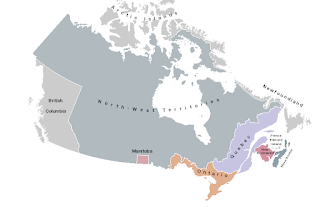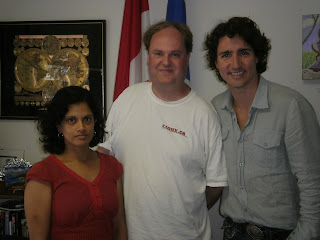One of the very visible features of this protest was a lack of understanding by most of the supporters I heard from of how Canada's legal and governance systems work.
Tamara Lich's husband provided an obvious example in court.
Canada's First Amendment
"Honestly? I thought it was a peaceful protest and based on my first amendment, I thought that was part of our rights," he told the court.
"What do you mean, first amendment? What's that?" Judge Julie Bourgeois asked him.
As my high school teaching wife would say: This is a good teachable moment.
I suspect many Canadians get their ideas of domestic law from watching police and courtroom dramas from the United States.
Tamara Lich's husband, who admitted he wasn't very politically or legally literate, was making an obvious reference to the First Amendment to the United States Constitution. That amendment protects freedom of speech, the press, assembly, and the right to petition the Government for a redress of grievances.
You can read on social media all the discussion this drew. These are people who claim they aren't political, demonstrate a lack of basic knowledge of Canadian politics and law, and yet helped organize an illegal event supported primarily by foreign money and backing. They even think of themselves as patriots, although I'm not sure of which country.
What was the first amendment to the Canadian Constitution?
The official Governments of Canada answer: Manitoba Act 1870. A more complete list is available on the Department of Justice website.
The accompanying map is helpful for context, given many Canadians believe a myth that these "provinces" democratically joined "The Dominion of Canada", and in the form they are today. There is some very important history to learn to understand what Canada is and how it operates.
Canada's Origin Story
The answer of the Manitoba Act is only part of the story.
Canada was created and maintained by the British through a series of Acts of the British (later UK) parliament.
In 1867 it was a small number of British citizens (Western European, white, men) in a white minority part of the world who asked their government (Britain) to pass a law to create a new subsidiary of the British Empire. It wasn't the democratic will of the inhabitants, the majority of which weren't European and had their own existing (many democratic for centuries) governments. Many weren't even informed.
Some key acts to be aware of:
- The 11 British North America Acts: It is actually BNA 1871 that confirmed Manitoba in the Constitution, as the British retained more control over Canadian law than they granted to the subsidiary governments on this side of the Atlantic. While Part VI of BNA 1867 (Sections 91-95 of the Canadian Constitution) created separate jurisdiction for federal and provincial responsibility, that limitation didn't apply to the British who could legislate at any level they wished - including the Canadian Constitution which only the British government could amend.
- Statute of Westminster 1931 - this is when Britain granted several of its colonies, including Canada, the ability to have foreign policy. Technically Canada never declared war during the First World War, and "Canadians" participated in that war as British Subjects.
- Canada Act 1982
: This is where the British terminated their power to legislate for
Canada. This is the (most likely) final British amendment to Canada's Constitution,
and the creation of a new amending formula allowing governments on this
side of the Atlantic to amend the Canadian Constitution.
SCHEDULE B, Part I, is the new Canadian Charter of Rights and Freedoms.
While the existing Constitution sections 91-95 clarified jurisdiction for federal and provincial governments, the new Constitution section 35 as well as Charter section 25 clarified jurisdiction and rights for Indigenous governments.
If you don't yet know what the Royal Proclamation 1763, Treaty of Niagara 1764, or the Quebec Act 1774 is, then you don't yet know the foundations of Canada or Canadian law.
Government jurisdiction
This origin story of Canada, which we should all have been taught, is critically important to understanding what happened.
I discussed earlier that there weren't mandates (to vaccinate, wear masks, "lock down", etc) that were targeted at individuals, only workplaces. Individual rights were not being restricted as no individual has a right to enter other people's homes or workplace and ignore policies set for those locations.I use brackets in the above as the constitution separates jurisdictional powers between Canadian Federal, Canadian Provincial, and Indigenous governments. Municipal governments are provincially created and regulated corporations, and Indian Act band councils are federally created/regulated entities. These are not independent levels of responsible government, but bodies responsible to the level of government which created and regulates them.
The vast majority of what people think the protesters were asking for, to "end all mandates", was outside of the jurisdiction of the Canadian Federal government. Even if the Government of Canada wanted to end all mandates, they do not have the power under the Canadian Constitution to do so.
To say that in the reverse: The federal government, and Trudeau as Prime Minister, has nothing to do with a vast majority of the mandates protesters were angry about. These are independent decisions being made by multiple independent levels of government, primarily making use of independent public health units to help direct them during a critical time.
The type of centralized decision making that the protesters believed was happening is simply not possible. Public health mandates were not in any way a top-down decision made by a single individual, and health is primarily a provincial responsibility.
Canadian Parliaments: and what is a "minority government"
I believe Canada's Democratic Institutions have been weakened by the transition of Political Parties from being a caucus formed within and accountable to elected parliamentarians, to being unaccountable corporations operating outside of parliament that manipulate parliamentarians.
That said, Canada's Democratic Institutions are currently still far stronger than the protesters were alleging.
Justin Trudeau is currently the Prime Minister of Canada. He is not the King of Canada, and does not have the level of control that protesters seemed to believe he has.
Justin Trudeau is the current leader of the political party that has a plurality of seats in the House of Commons. This is a plurality, as the Liberal party of Canada would have needed 11 more seats to have a majority. The governing party must get support from at least one of the other larger parties (Green Party with 2 seats not sufficient) in order to pass any specific legislation. The opposition has a majority, and can force an election nearly any time (there are some minor procedural limitations) if they wish to discontinue the current parliament and try again at changing the makeup of parliament.
For those who don't pay attention, the most recent general election was in September 2021. Canada has general elections (for all seats) and by-elections (for a subset), and doesn't actually have a "federal election" with a common ballot question for all voters. The House of Commons is not an electoral college like the USA has to chose their President, although you couldn't tell from how the media (foreign or domestic) misreports Canadian elections as if they were in any way similar to US presidential elections!
So, is it possible for Trudeau to act as a Dictator? No, not in the slightest.
He can act like a petulant child, and constantly say unhelpful things when in front of a microphone, but he can't act as a dictator.
Is Trudeau the best person to be representing Canada's federal government as the Prime Minister? For this my personal opinion is strongly: No!
I don't like Trudeau for many reasons, and consider him an embarrassment as Prime Minister. Not liking Trudeau is not the same thing as believing he has power that he doesn't have, or that I will blame him for things which he has no control over.
I also want a better Prime Minister, but I want that accomplished through stronger democratic institutions and not by an angry mob of people who didn't spend any time trying to understand the basics of how governments work making DEMANDS of any democratically (by Canadian standards) elected government.
Advise for First Time Protesters
When listening to interviews of protesters (live streams, more formal media, etc), or reading things said by and interacting with supporters on social media, I got the distinct impression that this is the first time they have protested or paid attention to any government policy.
I can't recall exactly, but I started getting more politically involved in the early 1990's. I've been to many protests over the decades, some which I now recognize as ineffective as I didn't really understand the relevant governance institutions in my youth. I've since met many politicians (before, during and after they were parliamentarians), some of which I even consider friends.
I would love to share as much as I can, and encourage others to get more politically informed and involved. I do, however, believe it is critical that you do your homework if you want to be effective.
- Research if the policy concern is real. There are many political opportunists out there, including politicians and the media, who want to use you as a pawn for their own special interests. They will abuse confusion to create anger, and then point you at a target of their choosing which likely has nothing to do with the alleged problem.
- Learn about the organizers of any political movement or protest. Don't assume that their "marketing brochure" is actually their goal. Don't take actions based on marketing which is regularly deceptive, but based on actual goals of the organizers.
- Learn what level of government, and sometimes exactly which department or ministry, the policy you are critical of originates from. The easiest way to get dismissed by anyone involved in governance is to come to them with problems which have nothing to do with them: they are very busy, and teaching you basic civics is not part of their job.
- Recognize that protests involved people, and possibly banners, flags and other such things to make the message clear. They don't involve heavy machinery, which is what changed the nature of what might have been thought of as a protest into something illegal, and what many considered a siege.




No comments:
Post a Comment